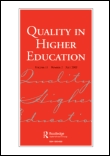
Quality in Higher Education
Scope & Guideline
Pioneering Research for Educational Excellence
Introduction
Aims and Scopes
- Quality Assurance Practices:
The journal focuses on the methodologies, frameworks, and practices surrounding quality assurance in higher education, including accreditation processes and standards. - Student Engagement and Perspectives:
Research often emphasizes the role of student involvement in quality assurance processes, highlighting their perspectives on educational quality and the impact of institutional practices on their learning experiences. - Comparative Analysis of Educational Systems:
The journal publishes comparative studies that analyze quality assurance practices across different countries and educational systems, providing insights into global trends and challenges. - Impact of Institutional Factors:
The influence of various institutional factors on educational quality, including governance, funding, and leadership, is a recurring theme in the journal's publications. - Emerging Educational Technologies:
The integration of technology in education, such as eLearning and MOOCs, is explored in relation to quality assurance and student outcomes.
Trending and Emerging
- Student-Centric Quality Assurance:
There is a growing trend towards student involvement in quality assurance processes, with research focusing on how student perspectives can inform and enhance educational practices. - Impact of COVID-19 on Quality Assurance:
The pandemic has prompted investigations into how quality assurance frameworks can adapt to online and hybrid learning environments, making this a highly relevant and emerging theme. - Sustainability and Quality in Education:
Emerging discussions around sustainability in higher education are increasingly intersecting with quality assurance, exploring how educational institutions can balance quality with environmental and social responsibility. - Data-Driven Decision Making:
There is a notable increase in research focused on the use of data analytics in improving quality assurance processes, emphasizing the importance of evidence-based decision-making in higher education. - Globalization of Quality Assurance Practices:
The globalization of higher education is driving research into cross-border quality assurance practices, examining how institutions can maintain standards in diverse international contexts.
Declining or Waning
- Traditional Quality Metrics:
There seems to be a waning interest in traditional metrics of educational quality, such as standardized testing and simplistic ranking systems, as newer, more holistic approaches gain traction. - Static Accreditation Models:
Static models of accreditation that do not adapt to the dynamic nature of educational environments are appearing less frequently, as scholars advocate for more flexible and responsive quality assurance frameworks. - Narrow Scope of Quality Definitions:
Previous narrow definitions of quality, often limited to performance metrics, are being replaced by broader, more inclusive understandings that consider diverse stakeholder perspectives. - Focus on Compliance Over Improvement:
An emphasis on compliance with regulatory standards over genuine quality improvement initiatives is declining, as institutions increasingly seek to foster a culture of continuous enhancement.
Similar Journals
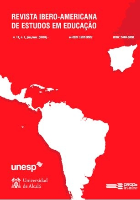
Revista Ibero-Americana de Estudos em Educacao
Advancing educational dialogue across Ibero-America.Revista Ibero-Americana de Estudos em Educacao, ISSN 2446-8606, is a distinguished open-access journal published by the Universidade Estadual Paulista (UNESP) since 2006. This journal is dedicated to advancing research in the field of education across the Ibero-American region, fostering a thoughtful dialogue on educational theories, practices, and policies. With a commitment to disseminating knowledge widely, it serves as a vital platform for educators, researchers, and policymakers to share transformative ideas and empirical studies. The journal publishes original research articles, reviews, and theoretical discussions, contributing significantly to the ongoing development in educational practices. Based in Assis, Brazil, it aims to bridge gaps in educational research and contribute to the enhancement of educational systems in Spanish and Portuguese-speaking countries. The Revista Ibero-Americana de Estudos em Educacao is poised to be a critical resource for those dedicated to improving educational outcomes and promoting equity in education.

Innovacion Educativa-Mexico
Championing research that shapes the future of education.Innovacion Educativa-Mexico is a premier academic journal dedicated to advancing the field of educational innovation, with a strong emphasis on practices and research that enhance learning outcomes in Mexico and beyond. Published by the Instituto Politécnico Nacional (IPN), this journal plays a crucial role in disseminating original research, case studies, and theoretical discussions that address contemporary challenges in education. With its ISSN 1665-2673 and E-ISSN 2594-0392, Innovacion Educativa-Mexico provides a valuable platform for scholars, educators, and practitioners to share their insights and foster collaboration aimed at improving educational systems. While it currently operates under a traditional access model, the journal’s commitment to quality and relevance is reflected in its ongoing efforts to maintain high academic standards. Residing at the heart of Mexico City, the journal is strategically positioned to address local educational challenges while contributing to the global dialogue on innovative pedagogical practices.

RESEARCH IN HIGHER EDUCATION
Connecting research with real-world educational challenges.RESEARCH IN HIGHER EDUCATION is a prestigious, peer-reviewed journal published by SPRINGER, focusing on the diverse and dynamic field of higher education research. Established in 1973, this journal serves as an essential platform for academics, practitioners, and policymakers seeking to advance knowledge in higher education effectiveness, student outcomes, and educational policies. With its impressive impact factor and recognition as a Q1 journal in Education, it ranks #332 out of 1543 in the Scopus category, placing it in the 78th percentile among its peers. Although it does not offer open-access options, the journal's extensive research contributions are invaluable to scholars dedicated to understanding and improving higher education systems globally. Recognized for its rigorous scholarship, RESEARCH IN HIGHER EDUCATION plays a critical role in shaping educational practices and policies, making it an indispensable resource for researchers, educators, and students alike.

Canadian Journal of Higher Education
Exploring Innovative Pathways in Canadian Higher EducationThe Canadian Journal of Higher Education, published by the Canadian Society for the Study of Higher Education, is a pivotal platform in the field of higher education research. Since its inception in 1971, this Open Access journal has championed the dissemination of innovative and impactful scholarly work that contributes to the understanding and advancement of higher education in Canada and beyond. With a commitment to accessibility, it ensures that researchers, professionals, and students can engage with high-quality research without barriers. The journal serves as a critical resource for those interested in policy analysis, pedagogical practices, and the socio-economic dimensions of higher education, fostering dialogue and collaboration among academics and practitioners. By promoting rigorous and diverse examinations of issues facing post-secondary education, the Canadian Journal of Higher Education plays an essential role in shaping the landscape of academic discourse in this vital field.
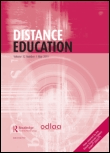
Distance Education
Transforming Learning in the Digital AgeDistance Education is a premier academic journal published by Routledge Journals, Taylor & Francis Ltd, specializing in the dynamic and rapidly evolving fields of education and e-learning. With an impressive impact reflected in its Q1 rankings in both education and e-learning categories for 2023, this journal stands out as a leader in disseminating high-quality research and innovative practices that inform and inspire educators, policymakers, and researchers globally. The journal has been at the forefront of distance education studies since 1980 and continues to provide critical insights into pedagogical approaches, technological advancements, and learner engagement methodologies. Although it does not offer open access options, its rigorous peer-review process ensures that contributions are both impactful and relevant. Located in the United Kingdom at 2-4 Park Square, Milton Park, Abingdon, OX14 4RN, Oxon, England, it serves as an essential resource for anyone invested in the future of education, aiming to bridge the gap between traditional and online learning environments.

Sodobna Pedagogika-Journal of Contemporary Educational Studies
Advancing educational discourse through contemporary research.Sodobna Pedagogika - Journal of Contemporary Educational Studies is a vital publication dedicated to advancing the field of education through contemporary research and scholarly discussions. Published by the Slovenian Association of Educationalists, this journal serves as a platform for educators, researchers, and practitioners to explore innovative educational practices and theories. With a Q4 status in Education and currently ranked #1182 out of 1543 within its category by Scopus, it strives to disseminate quality research that addresses the challenges and dynamics of modern educational contexts. Operating out of Slovenia, the journal emphasizes open dialogue and the exchange of ideas among diverse educational stakeholders, fostering an inclusive environment for learning and growth. As an important resource for those involved in educational studies, it plays a crucial role in tackling pressing issues and enhancing pedagogical practices from 2015 to 2024 and beyond.
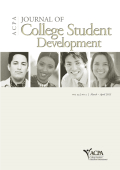
JOURNAL OF COLLEGE STUDENT DEVELOPMENT
Elevating the Student Experience with Empirical ResearchJOURNAL OF COLLEGE STUDENT DEVELOPMENT is a premier academic publication dedicated to advancing the field of higher education and student affairs. Published by Johns Hopkins University Press, this journal holds a distinguished Q1 ranking in Education for 2023 and ranks 582nd out of 1543 in the Scopus database, placing it in the 62nd percentile among social sciences education journals. The journal aims to provide contemporaneous insights and empirical research that foster the development of college students, with a focus on enhancing student experiences, promoting well-being, and advocating for effective educational policies. Though it does not offer open access options, it remains a vital resource for researchers, professionals, and students alike, who are invested in exploring innovative approaches to student success and engagement. With a continuous publication span from 1996 to 2024, JOURNAL OF COLLEGE STUDENT DEVELOPMENT serves as a cornerstone for scholarly discourse in the dynamic landscape of higher education.
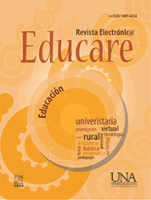
Revista Electronica Educare
Advancing Educational Research Without Barriers.Revista Electronica Educare, published by UNIV NACL, CIDE in Costa Rica, stands as a vital resource in the field of education, contributing significantly to the discourse since its inception in 2001. As an Open Access journal, it promotes the dissemination of educational research globally, ensuring that valuable findings are accessible to a wider audience without financial barriers. With an increasing impact factor reflected in its current categorization in the Q3 quartile for education sciences and a Scopus rank of #989 among 1543 in Social Sciences, the journal is recognized for its quality and relevance in contemporary educational studies. The journal covers a broad spectrum of topics within the educational landscape until 2024, making it an essential platform for researchers, professionals, and students eager to explore innovative pedagogical practices and share their insights with the academic community. As it continues to evolve and flourish, Revista Electronica Educare invites contributors and readers alike to engage with the cutting-edge of educational research.

Debate Universitario
Connecting Ideas, Cultivating Understanding.Debate Universitario is a leading academic journal published by the UNIV ABIERTA INTERAMERICANA, focusing on the interdisciplinary study of contemporary social, political, and educational debates in Latin America. Established as an Open Access journal in 2012, it enables free and unrestricted access to high-quality research, fostering an inclusive platform for both emerging and established scholars. With an ISSN of 2314-2138 and an E-ISSN of 2314-1530, the journal serves as a vital conduit for discourse and critical analysis across various fields, including sociology, political science, and education. The editorial team is committed to presenting diverse perspectives that encourage dialogue and stimulate scholarly inquiry. Based in Buenos Aires, Argentina, the journal highly values contributions that not only address but also engage with current challenges and developments in the region, making it an essential resource for researchers, professionals, and students interested in the dynamic landscape of Latin American studies.

Innovative Higher Education
Exploring new methodologies to enhance learning outcomes.Innovative Higher Education, published by SPRINGER, stands as a leading academic journal in the field of educational research, focusing on transformative practices and new methodologies within higher education contexts. With an impressive Q1 rating in the prestigious Education category and a prominent Scopus ranking of #337 out of 1543 in Social Sciences, this journal offers a vital platform for research that enhances pedagogical innovation and academic policy discourse. Since its inception in 1983, the journal has successfully navigated the evolving landscape of higher education, providing insights and empirical evidence that resonate with researchers, academics, and practitioners. While the journal is not currently open access, it remains essential for those dedicated to advancing educational excellence and reform. The ISSN for print is 0742-5627, with an E-ISSN of 1573-1758, ensuring robust visibility for published articles on a global scale. As the landscape of higher education continually evolves, Innovative Higher Education is committed to fostering dialogue and sharing knowledge that drives innovation and improves learning outcomes.